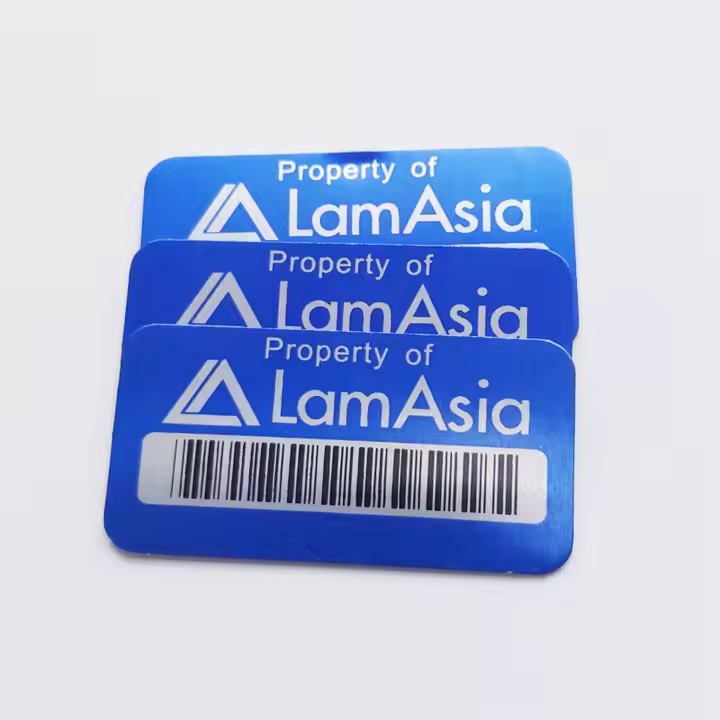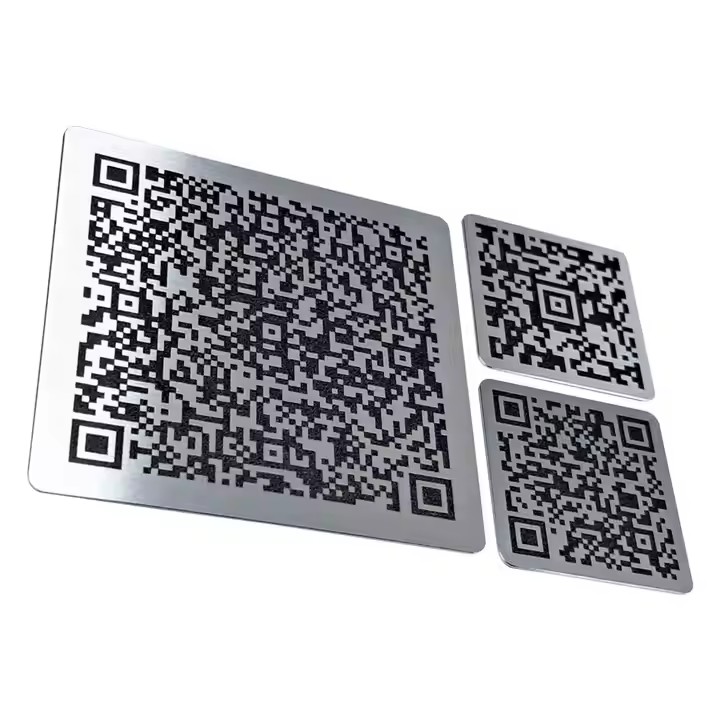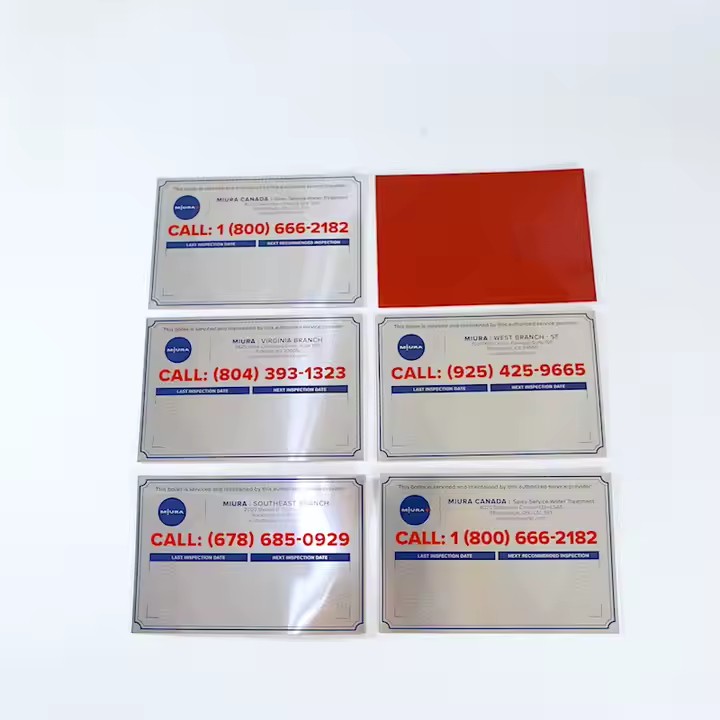When it comes to creating custom metal labels, one of the most important decisions you’ll make is the choice of metal. Different metals offer distinct characteristics that can influence the durability, appearance, and cost-effectiveness of the labels. In this post, we will explore the most common materials used for metal labels and discuss their pros and cons to help you make an informed decision based on your needs.
1. Stainless Steel
Pros:
-
Durability: Stainless steel is renowned for its exceptional strength and resistance to corrosion, making it ideal for outdoor and industrial environments.
-
Aesthetic Appeal: With its sleek, shiny surface, stainless steel offers a high-end, professional look that is both modern and sophisticated.
-
Resistant to Stains and Scratches: Stainless steel has a hard surface that resists scratches, stains, and general wear and tear.
-
Easy to Clean: The non-porous surface is easy to clean and maintain, keeping the label looking pristine over time.
Cons:
-
Weight: Stainless steel is heavier compared to other materials like aluminum, which could be a consideration for specific applications where weight is a concern.
-
Cost: It tends to be more expensive than other metals due to its durability and resistance to corrosion.
-
Limited Flexibility: Stainless steel can be more difficult to shape or manipulate for intricate designs, which may be a limitation for some custom applications.
Best For:
-
Industrial equipment
-
Outdoor signage
-
Premium products or branding
2. Aluminum
Pros:
-
Lightweight: Aluminum is much lighter than stainless steel, making it easier to handle and install, especially for larger labels.
-
Corrosion Resistance: Aluminum is naturally resistant to rust, although it can be prone to scratches and dents if not treated properly.
-
Cost-Effective: It is generally less expensive than stainless steel, making it a more budget-friendly option.
-
Customizable: Aluminum is easier to shape and cut, which makes it a good choice for more intricate or detailed designs.
Cons:
-
Less Durability: While it is resistant to corrosion, aluminum is softer than steel, meaning it can get scratched or dented more easily.
-
Appearance: The natural finish of aluminum is duller compared to stainless steel, though this can be remedied with anodizing or other finishes.
-
Environmental Impact: While recyclable, the environmental impact of aluminum production is higher than some other materials.
Best For:
-
Product labels
-
Indoor signage
-
Branding and promotional materials
3. Brass
Pros:
-
Elegant Appearance: Brass offers a beautiful, golden tone that gives it a premium and sophisticated appearance, making it ideal for luxury branding.
-
Corrosion Resistance: Brass is highly resistant to corrosion, even in harsh weather conditions.
-
Durability: While softer than stainless steel, brass is still a very durable material that can withstand wear and tear over time.
Cons:
-
Price: Brass is typically more expensive than aluminum, though it is still less costly than stainless steel.
-
Oxidation: Over time, brass may develop a patina, which can alter its appearance. While some may find this appealing, it may not be ideal for all projects.
-
Scratch Sensitivity: Brass can be prone to scratches and dents, especially in softer, thinner forms.
Best For:
-
Luxury products and branding
-
Decorative labels and plaques
-
High-end gifts and awards
4. Copper
Pros:
-
Distinctive Look: Copper offers a unique, reddish-brown color that stands out, giving it an eye-catching appeal.
-
Corrosion Resistance: Copper naturally develops a protective patina over time that makes it resistant to further corrosion, adding character to the label.
-
Durability: Copper is relatively strong and durable, providing longevity in use.
Cons:
-
Price: Like brass, copper is typically more expensive than aluminum and may not be the most cost-effective choice for all projects.
-
Softness: Copper is softer than both stainless steel and brass, making it more prone to scratches and dents, especially in thin forms.
-
Oxidation: The patina, while protective, may not be desirable for all applications. The darkening of the copper surface may be a drawback for those seeking a shiny, polished finish.
Best For:
-
Custom home décor
-
Decorative signage
-
Limited edition products or artistic applications
5. Zinc
Pros:
-
Affordability: Zinc is one of the most cost-effective materials available for metal labels, making it an excellent choice for businesses on a budget.
-
Corrosion Resistance: Zinc has a natural resistance to corrosion and can withstand outdoor conditions without significant degradation.
-
Ease of Customization: Zinc is easy to shape and mold, making it a great option for intricate designs and customized labels.
Cons:
-
Softness: Zinc is relatively soft and can be easily scratched or damaged, making it less suitable for environments with heavy wear and tear.
-
Appearance: Zinc doesn’t have the polished, sleek appearance of metals like stainless steel or brass. Its appearance may be less attractive if a high-end look is required.
-
Weight: Zinc is heavier than aluminum, but not as heavy as stainless steel.
Best For:
-
Budget-friendly product labeling
-
Indoor applications
-
Non-luxury items or mass-produced products
6. Bronze
Pros:
-
Durability: Bronze is a highly durable material that resists corrosion and wear, making it perfect for long-term use.
-
Unique Aesthetic: Bronze has a distinct brownish hue that can add a vintage or antique look to custom metal labels.
-
Strength: Bronze is tougher than brass and aluminum, making it ideal for high-traffic areas or industrial settings.
Cons:
-
Price: Bronze tends to be more expensive than both aluminum and zinc, making it less affordable for large-scale projects.
-
Oxidation: Like copper and brass, bronze will develop a patina over time, which may or may not be desirable depending on your design.
-
Heaviness: Bronze is heavier than many other metals, which may be a consideration if you are looking for a lightweight option.
Best For:
-
Vintage-style branding
-
Industrial or outdoor applications
-
Artistic, one-of-a-kind items
Conclusion
Choosing the right metal for your custom labels depends on a variety of factors, including durability, appearance, cost, and the intended application. Whether you opt for the sleek and durable stainless steel, the lightweight aluminum, the luxurious brass, or any other metal, understanding the pros and cons of each material will help you select the best option for your needs.
By carefully considering the material properties that matter most to you, you can create high-quality custom metal labels that stand the test of time while reflecting your brand’s personality and values.
If you need help selecting the perfect metal or have more specific requirements, feel free to reach out to an expert. Let’s create a label that reflects your brand’s quality and craftsmanship!

![]()
![]()






